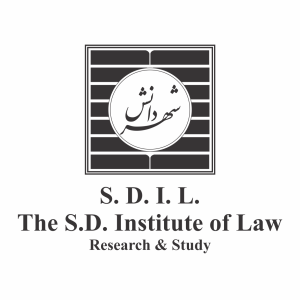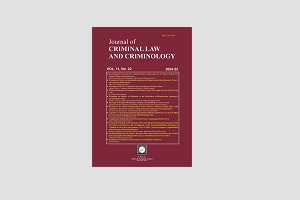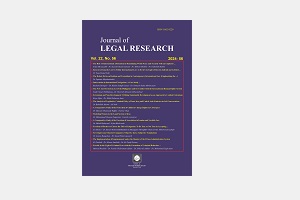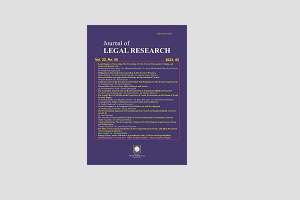Journal of
Legal Research
Number 5
Vol. III No. 1
Spring – Summer 2004
Managing Editor: Vahid Eshtiagh
Editor-in-Chief: Seyyed Ghasem Zamani
Contents
Articles
Integration of Islamic Countries and Specially Iran into International Legal-Economic System and its Challenges
Behrooz Akhlaghi (Ph.D.)
Public Hearing in the Light of International Instruments and National Law
Ali Khaleghi (Ph.D.)
Judicial Interpretation of the Iranian Constitution and the Practice of the Administrative Court of Justice
Parvaneh Tila
International Court of Justice and the Advisory Opinion on Legal Consequences Arising from Construction of the Wall by Israel in the Occupied Palestinian Territory
Amin Zarefar & Hamid Hashemi
The New Resolution of the IAEA Board of Governors on Iran An Assessment of the Respect for International Law
Nader Saed
Concept, Legal Nature and Formalities of Buy Back Investment Contracts
Javanmard Sadeghi
The Protection of Patents in the World Trade Organization
Amir Saed Vakil
Methods of Restitution of Contractual Obligation Breach in the International Sales of Goods Convention
Mohsen Sadeghi
The Prosecution of Senior State Officials in National Tribunals for International Crimes (Some Comments on the Congo v. Belgium Case)
Antonio Cassese
Translated by: Hamid Reza Javidzadeh
Special Issue: Insufficiencies of the Law of Companies
in Iran
Legal Aspects of Capital in Joint-Stock Companies (Round-table(
The Necessity of Amendment of Iranian Commercial Code Concerning Minimum Capital of Joint-Stock Companies
Vahid Eshtiagh (Ph.D.)
The Rights of Minority Shareholders in Merger or Consolidation of Corporations
Ahmad Beigi Habibabadi (Ph.D.(
Control of the Activities of Directors by Governmental Agencies in English and Iranian Legal Systems
Seyed Elhameddin Sharifi (Ph.D.)
Legal Formalities for Transfer of Shares in Joint-Stock Companies
Saeed Safian
Critique and Presentation
Reflections on UN Security Council Resolution 1559 on Lebanese Sovereignty and Withdrawal of Foreign Forces
Seyed Ghasem Zamani (Ph.D.(
Articles
Integration of Islamic Countries and Specially Iran into Interntaional Legal-Economic System and its Challenges
Behrooz Akhlaghi (Ph.D.)
Abstract:
There is observed an increasing urgent need for integration of developing
countries into the international economic-legal system and WTO.
As a matter of fact, these countries are confronted with many
challenges in this way, but we must bear in mind that joining the WTO is
not a solution for all their economic problems.
They must want it and stick to their wills and determination and
employ all best efforts for developing their countries. It may be useful to
choose South Korea as a model in this regard.
Public Hearing in the Light of International Instruments
and National Law
Ali Khaleghi (Ph.D.)
Abstract:
Public hearing is one of the important guarantees in criminal proceedings
which is emphasized in the Constitutions of several countries and different
international instruments. This principle is also included in the Iranian
Constitution and in the international Covenant on civil and political rights,
approved by the Parliament, hence it has a remarkable place in our legal
system. However, sometimes the Iranian legislator has not completely
respected this essential principle, and restricted its scope. The present
article aims to clarify the foundation and content of this principle and to
show its limitations in Iranian law.
Judicial Interpretation of the Iranian Constitution and the
Practice of the Administrative Court of Justice
Parvaneh Tila
Abstract:
In the Iranian law as any other written legal system, the Constitution is the
highest source of laws and therefore any contradictory laws would be void
and illegal. In order to guarantee the respect of superior rules or laws by
the regulations adopted by the Executive power, several legal supervisions
have been established. This article analyzes the role of the Iranian Court
of Administrative Justice (CAJ) (Divan -e- Edalat -e- Edari) in this way.
The author believes that interpretative function is not only through the
formal interpretation by the Iranian Guardian Council (Shora -ye-
Negahban) but also through the jurisprudence i.e., practice of (at least,
administrative) judges and Judicial power. The practice of the CAJ
emphasizes its judicial interpretation of the Constitution and insists on the
supremacy of the Constitution.
International Court of Justice and the Advisory Opinion on
Legal Consequences Arising from Construction of the Wall by
Israel in the Occupied Palestinian Territory
Amin Zarefar & Hamid Hashemi
Abstract:
On 8 December 2003 and at its Tenth Emergency Special Session United
Nations General Assembly adopted Resolution ES-10/14 requesting
International Court of Justice for an Advisory Opinion on legal
consequences arising from construction of the wall by Israel in the
occupied Palestinian territory. On 9 July 2004 the Court issued its
Advisory Opinion while recognized its jurisdiction. In accordance with
United Nations Charter, General Assembly Resolution 2625, the principle
of self-determination of people, human rights and humanitarian law
conventions, the Court concluded that the Wall was illegal and so had to
be ceased immediately and Israel had to compensate. Moreover, other
states have obligation not to recognise that situation and to promote
realization of the principle of self-determination of people, to ensure
respect for regulations of forth Geneva conventions (1949) and United
Nations has obliged to adopt further measure in this matter.
The New Resolution of the IAEA Board of Governors on Iran,
An Assessment of the Respect for International Law
Nader Saed
Abstract:
On 18 September 2004, the IAEA Board of Governors adopted a
resolution on “The Implementation of the NPT Safeguard Agreements in
I.R. of Iran”. This article examines analytically the resolution as a practice
of the IAEA in light of public international law. It concluded that this
practice of the Board is contradicted with well-established principles of
international law.
Concept, Legal Nature and Formalities
of Buy Back Investment Contracts
Javanmard Sadeghi
Abstract:
Buy Back investment contracts play an increasing role in foreign
investment in Iran specially in the petroleum industry.
These contracts have a sui generis concept, legal nature and formalities,
which are analyzed in this article.
The Protection of Patents in the World Trade Organization
Amir Saed Vakil
Abstract:
Ideas and knowledge have an important role in trade. Patents protection as
an area covered by the TRIPS agreement in WTO must be available for
inventions both products and process in almost all fields of technology.
The agreement describes the minimum rights that a patent owner must
enjoy, but it also allows certain exceptions.
Methods of Restitution of Contractual Obligation Breach
in the International Sales of Goods Convention
Mohsen Sadeghi
Abstract:
Articles 74 to 77 of the International Sales of Goods Convention 1980 are
allocated to “breach of contract damages”. Declaring a general rule, article
74 speaks about necessity of resorting damages and art. 75 & 76 consider
the substitute transaction and the current price as two methods of
restitution. Art. 77 points to “mitigation of loss”. According to this rule, if
the damaged party fails to mitigate, he is not liable to claim damages in
the amount by which the loss should have been mitigated. Principles of
UNIDROIT, PECL, French and Iranian Law about compensation of
contractual obligation breach are different from the provisions of the
Convention.
The Prosecution of Senior State Officials
in National Tribunals for International Crimes
(Some Comments on the Congo v. Belgium Case)
Antonio Cassese
Translated by: Hamid Reza Javidzadeh
Abstract:
The recent decision of the international Court of justice has certainly
cleared an obscure domain of international law, i.e. personal immunity of
ministers of foreign affaires. Nevertheless, some conclusions of the Court
are open to criticism. The Court, not only has refused to declare its
position on the universal jurisdiction of the national tribunal, but also has
not made a distinction between functional and personal immunities. It
results that, according to the Court, the ministers of foreign affaires could
be prosecuted, after the period of their functions, for the international
crimes committed during their functions if these crimes are considered as
the private acts.
The Rights of Minority Shareholders
in Merger or Consolidation of Corporations
Ahmad Beigi Habibabadi (Ph.D.)
Abstract:
A Corporation typically recognizes its operations through a merger or
consolidation. In a merger, only one of the corporations continues to exist.
But in a consolidation, two or more corporations combine so that each
corporation ceases to exist and a new one emerges.
The important issue in a merger contract is its effects on shareholders.
In American, French and English law, there are protecting regulations in
favour of minority shareholders. In all of these legal systems there is
special approach for the benefit of minority shareholders.
This article presents the concerned regulations in these countries after
a brief study of the notion of merger and its different types. It shows also
that in the Iranian law, there are no such regulations about minority
shareholders, but regulating these matters is not contrary to our legal
principles and it is necessary for legislator to enact a law concerning
merger and protection of shareholders.
Control of the Activities of Directors by Governmental
Agencies in English and Iranian Legal Systems
Seyed Elhameddin Sharifi (Ph.D.)
Abstract:
Many legal systems as well as English law, have recognized that the abuse
of corporate powers by directors, can not be adequately constrained by
leaving it to the company’s member. Therefore, they have established
governmental agencies for exercise of a supervisory role in order to ensure
adequate performance of their functions, conferred legislative and judicial
power as well as administrative functions on those agencies.
English legal system has gone further from investigation into insider
trading, to investigation into Companies affair and share’s and title of the
companies. But in Iranian legal system governmental investigation has not
been recognized yet.
Legal Formalities for Transfer of Shares
in Joint-Stock Companies
Saeed Safian
Abstract:
The transfer of named and nameless shares in Joint-Stock companies have
different legal formalities. In this article these formalities are discussed in
point view of commercial code of Iran and judicial practice of courts.





